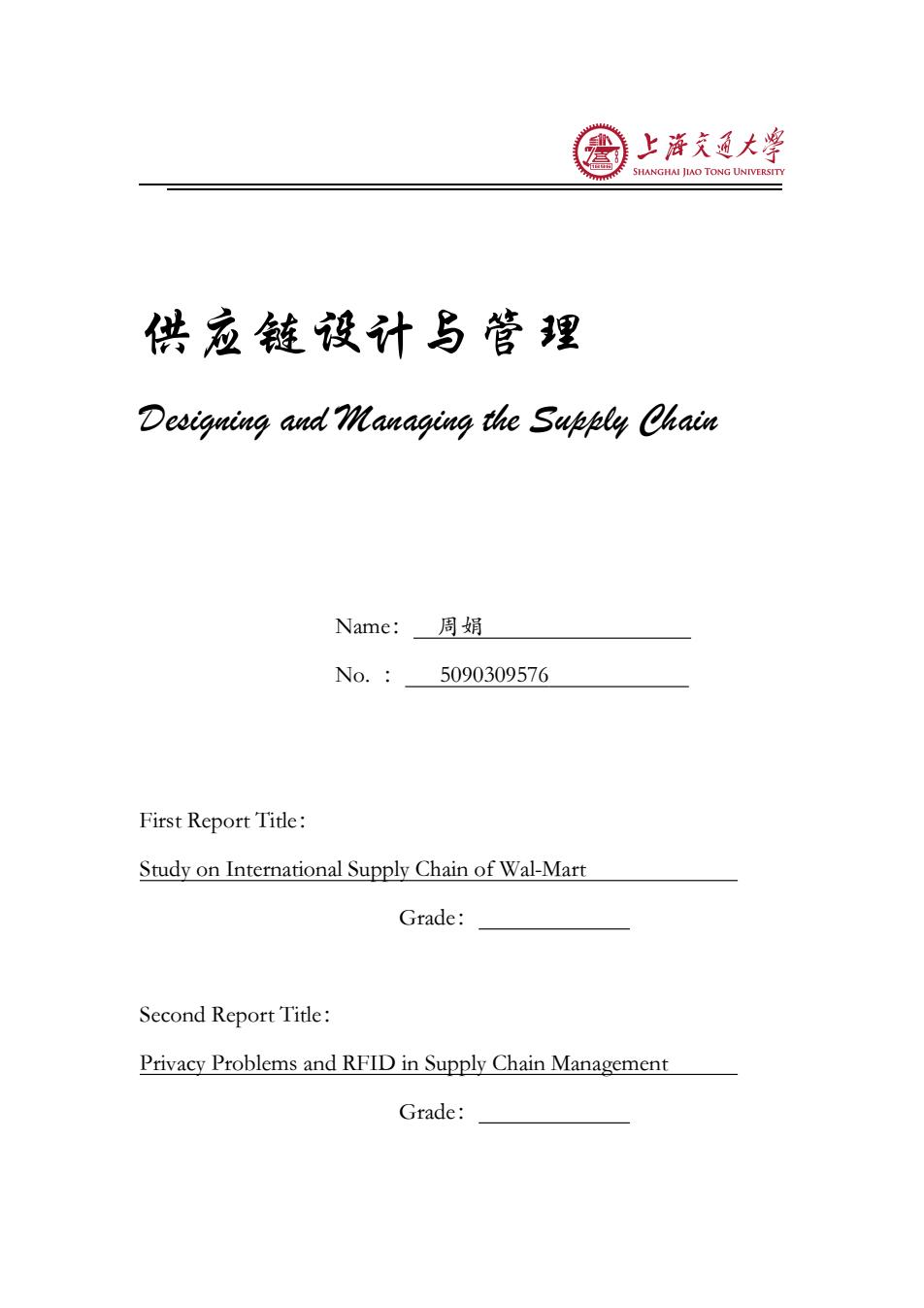
上游充通大 SHANGHAI JIAO TONG UNIVERSITY 供应链设计与管理 Designing and Wanaging the Supply Chain Name:周娟 No.: 5090309576 First Report Title: Study on International Supply Chain of Wal-Mart Grade: Second Report Title: Privacy Problems and RFID in Supply Chain Management Grade:
供应链设计与管理 Designing and Managing the Supply Chain Name: 周娟 No. : 5090309576 First Report Title: Study on International Supply Chain of Wal-Mart Grade: Second Report Title: Privacy Problems and RFID in Supply Chain Management Grade:
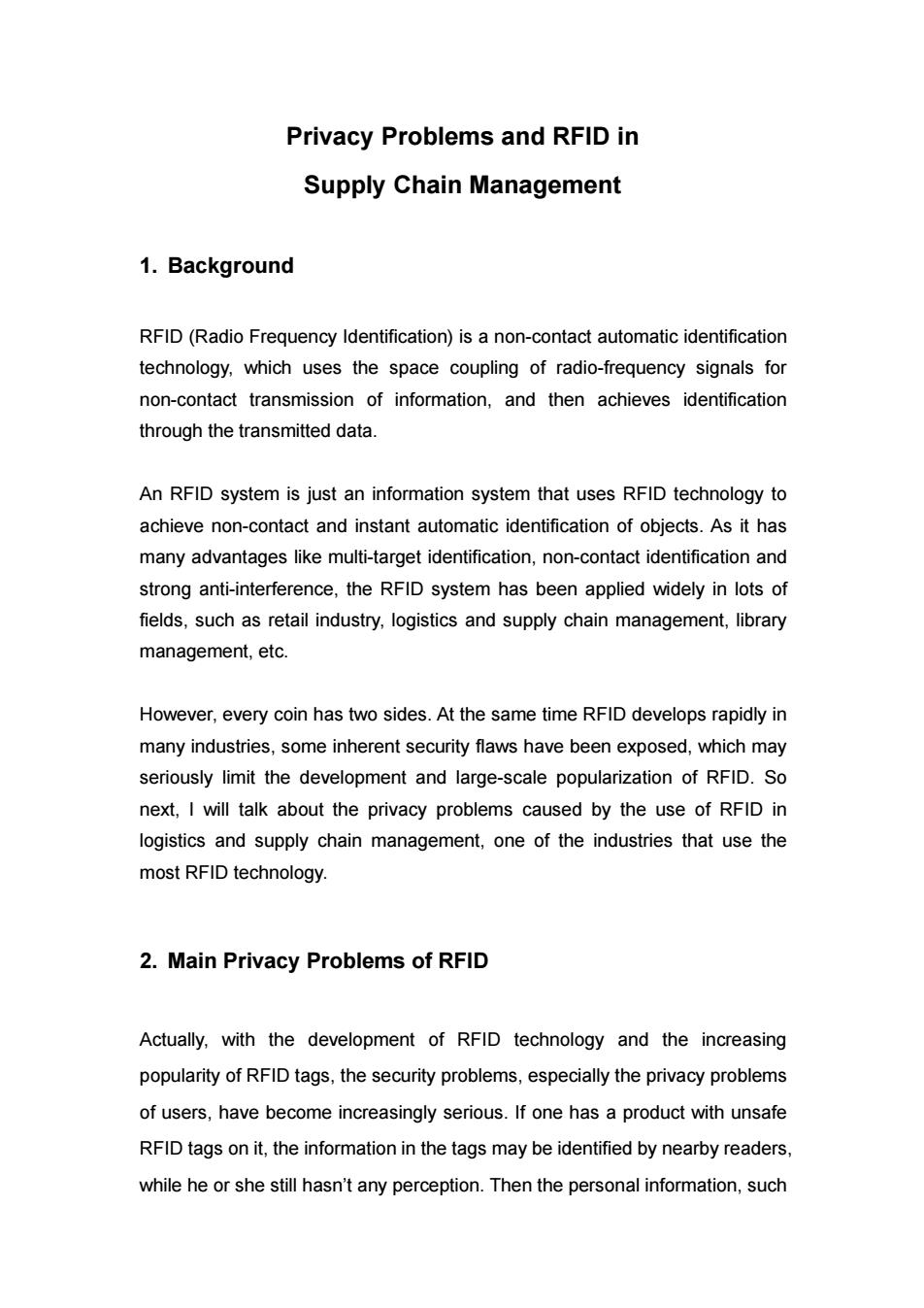
Privacy Problems and RFID in Supply Chain Management 1.Background RFID(Radio Frequency Identification)is a non-contact automatic identification technology,which uses the space coupling of radio-frequency signals for non-contact transmission of information,and then achieves identification through the transmitted data. An RFID system is just an information system that uses RFID technology to achieve non-contact and instant automatic identification of objects.As it has many advantages like multi-target identification,non-contact identification and strong anti-interference,the RFID system has been applied widely in lots of fields,such as retail industry,logistics and supply chain management,library management,etc. However,every coin has two sides.At the same time RFID develops rapidly in many industries,some inherent security flaws have been exposed,which may seriously limit the development and large-scale popularization of RFID.So next,I will talk about the privacy problems caused by the use of RFID in logistics and supply chain management,one of the industries that use the most RFID technology. 2.Main Privacy Problems of RFID Actually,with the development of RFID technology and the increasing popularity of RFID tags,the security problems,especially the privacy problems of users,have become increasingly serious.If one has a product with unsafe RFID tags on it,the information in the tags may be identified by nearby readers, while he or she still hasn't any perception.Then the personal information,such
Privacy Problems and RFID in Supply Chain Management 1. Background RFID (Radio Frequency Identification) is a non-contact automatic identification technology, which uses the space coupling of radio-frequency signals for non-contact transmission of information, and then achieves identification through the transmitted data. An RFID system is just an information system that uses RFID technology to achieve non-contact and instant automatic identification of objects. As it has many advantages like multi-target identification, non-contact identification and strong anti-interference, the RFID system has been applied widely in lots of fields, such as retail industry, logistics and supply chain management, library management, etc. However, every coin has two sides. At the same time RFID develops rapidly in many industries, some inherent security flaws have been exposed, which may seriously limit the development and large-scale popularization of RFID. So next, I will talk about the privacy problems caused by the use of RFID in logistics and supply chain management, one of the industries that use the most RFID technology. 2. Main Privacy Problems of RFID Actually, with the development of RFID technology and the increasing popularity of RFID tags, the security problems, especially the privacy problems of users, have become increasingly serious. If one has a product with unsafe RFID tags on it, the information in the tags may be identified by nearby readers, while he or she still hasn’t any perception. Then the personal information, such
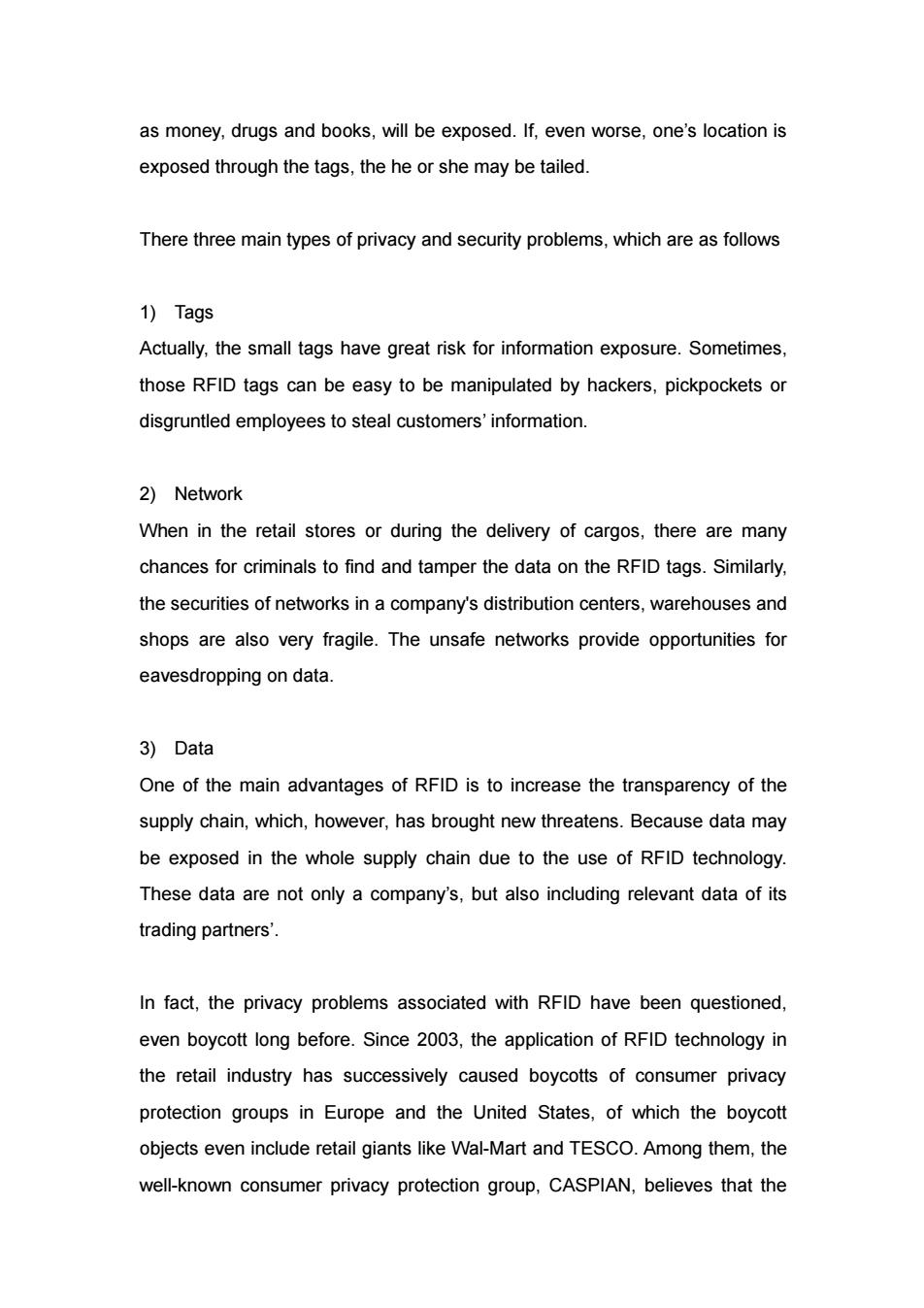
as money,drugs and books,will be exposed.If,even worse,one's location is exposed through the tags,the he or she may be tailed. There three main types of privacy and security problems,which are as follows 1)Tags Actually,the small tags have great risk for information exposure.Sometimes, those RFID tags can be easy to be manipulated by hackers,pickpockets or disgruntled employees to steal customers'information. 2)Network When in the retail stores or during the delivery of cargos,there are many chances for criminals to find and tamper the data on the RFID tags.Similarly, the securities of networks in a company's distribution centers,warehouses and shops are also very fragile.The unsafe networks provide opportunities for eavesdropping on data. 3)Data One of the main advantages of RFID is to increase the transparency of the supply chain,which,however,has brought new threatens.Because data may be exposed in the whole supply chain due to the use of RFID technology. These data are not only a company's,but also including relevant data of its trading partners'. In fact,the privacy problems associated with RFID have been questioned, even boycott long before.Since 2003,the application of RFID technology in the retail industry has successively caused boycotts of consumer privacy protection groups in Europe and the United States,of which the boycott objects even include retail giants like Wal-Mart and TESCO.Among them,the well-known consumer privacy protection group,CASPIAN,believes that the
as money, drugs and books, will be exposed. If, even worse, one’s location is exposed through the tags, the he or she may be tailed. There three main types of privacy and security problems, which are as follows 1) Tags Actually, the small tags have great risk for information exposure. Sometimes, those RFID tags can be easy to be manipulated by hackers, pickpockets or disgruntled employees to steal customers’ information. 2) Network When in the retail stores or during the delivery of cargos, there are many chances for criminals to find and tamper the data on the RFID tags. Similarly, the securities of networks in a company's distribution centers, warehouses and shops are also very fragile. The unsafe networks provide opportunities for eavesdropping on data. 3) Data One of the main advantages of RFID is to increase the transparency of the supply chain, which, however, has brought new threatens. Because data may be exposed in the whole supply chain due to the use of RFID technology. These data are not only a company’s, but also including relevant data of its trading partners’. In fact, the privacy problems associated with RFID have been questioned, even boycott long before. Since 2003, the application of RFID technology in the retail industry has successively caused boycotts of consumer privacy protection groups in Europe and the United States, of which the boycott objects even include retail giants like Wal-Mart and TESCO. Among them, the well-known consumer privacy protection group, CASPIAN, believes that the
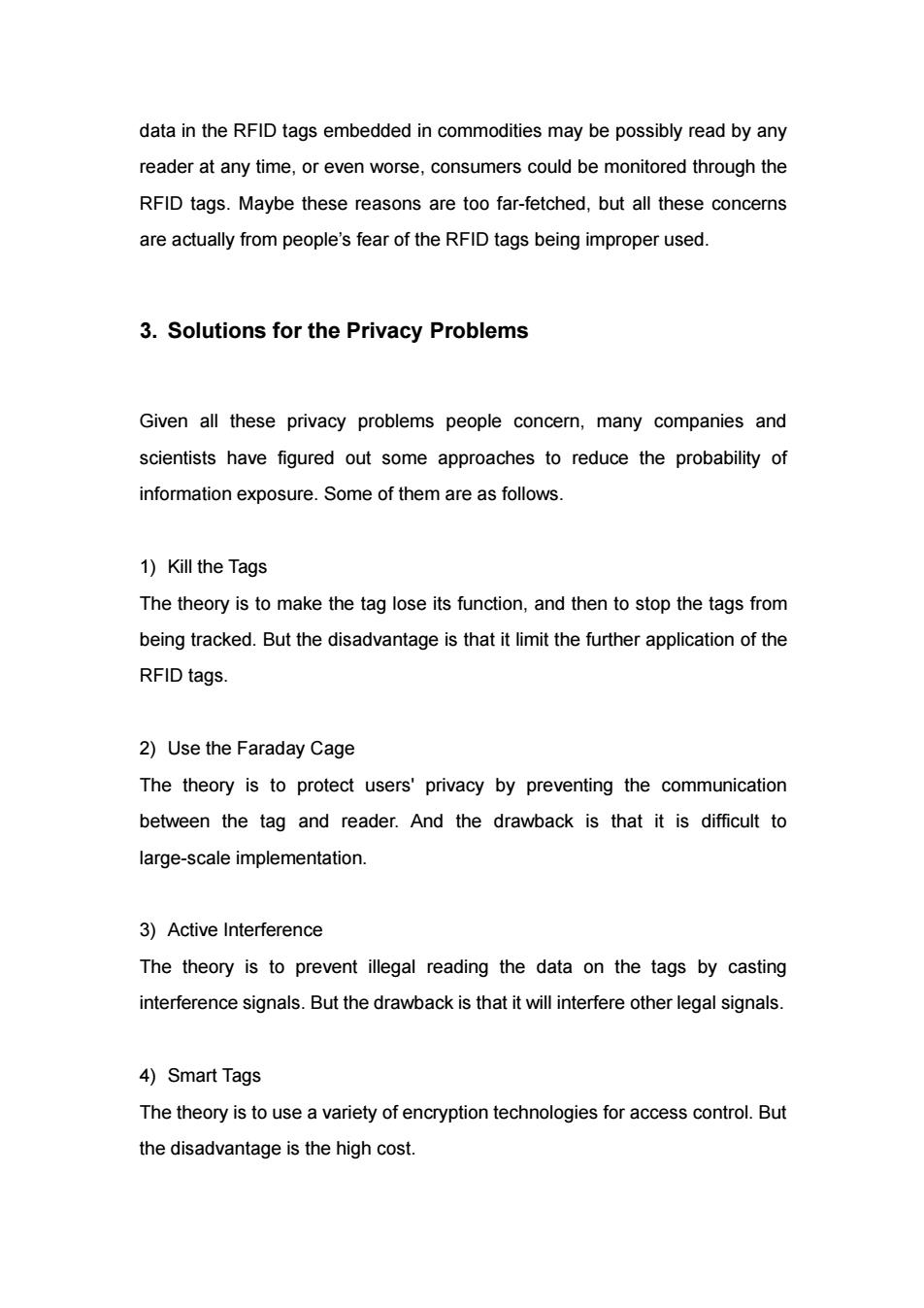
data in the RFID tags embedded in commodities may be possibly read by any reader at any time,or even worse,consumers could be monitored through the RFID tags.Maybe these reasons are too far-fetched,but all these concerns are actually from people's fear of the RFID tags being improper used. 3.Solutions for the Privacy Problems Given all these privacy problems people concern,many companies and scientists have figured out some approaches to reduce the probability of information exposure.Some of them are as follows. 1)Kill the Tags The theory is to make the tag lose its function,and then to stop the tags from being tracked.But the disadvantage is that it limit the further application of the RFID tags. 2)Use the Faraday Cage The theory is to protect users'privacy by preventing the communication between the tag and reader.And the drawback is that it is difficult to large-scale implementation. 3)Active Interference The theory is to prevent illegal reading the data on the tags by casting interference signals.But the drawback is that it will interfere other legal signals. 4)Smart Tags The theory is to use a variety of encryption technologies for access control.But the disadvantage is the high cost
data in the RFID tags embedded in commodities may be possibly read by any reader at any time, or even worse, consumers could be monitored through the RFID tags. Maybe these reasons are too far-fetched, but all these concerns are actually from people’s fear of the RFID tags being improper used. 3. Solutions for the Privacy Problems Given all these privacy problems people concern, many companies and scientists have figured out some approaches to reduce the probability of information exposure. Some of them are as follows. 1) Kill the Tags The theory is to make the tag lose its function, and then to stop the tags from being tracked. But the disadvantage is that it limit the further application of the RFID tags. 2) Use the Faraday Cage The theory is to protect users' privacy by preventing the communication between the tag and reader. And the drawback is that it is difficult to large-scale implementation. 3) Active Interference The theory is to prevent illegal reading the data on the tags by casting interference signals. But the drawback is that it will interfere other legal signals. 4) Smart Tags The theory is to use a variety of encryption technologies for access control. But the disadvantage is the high cost
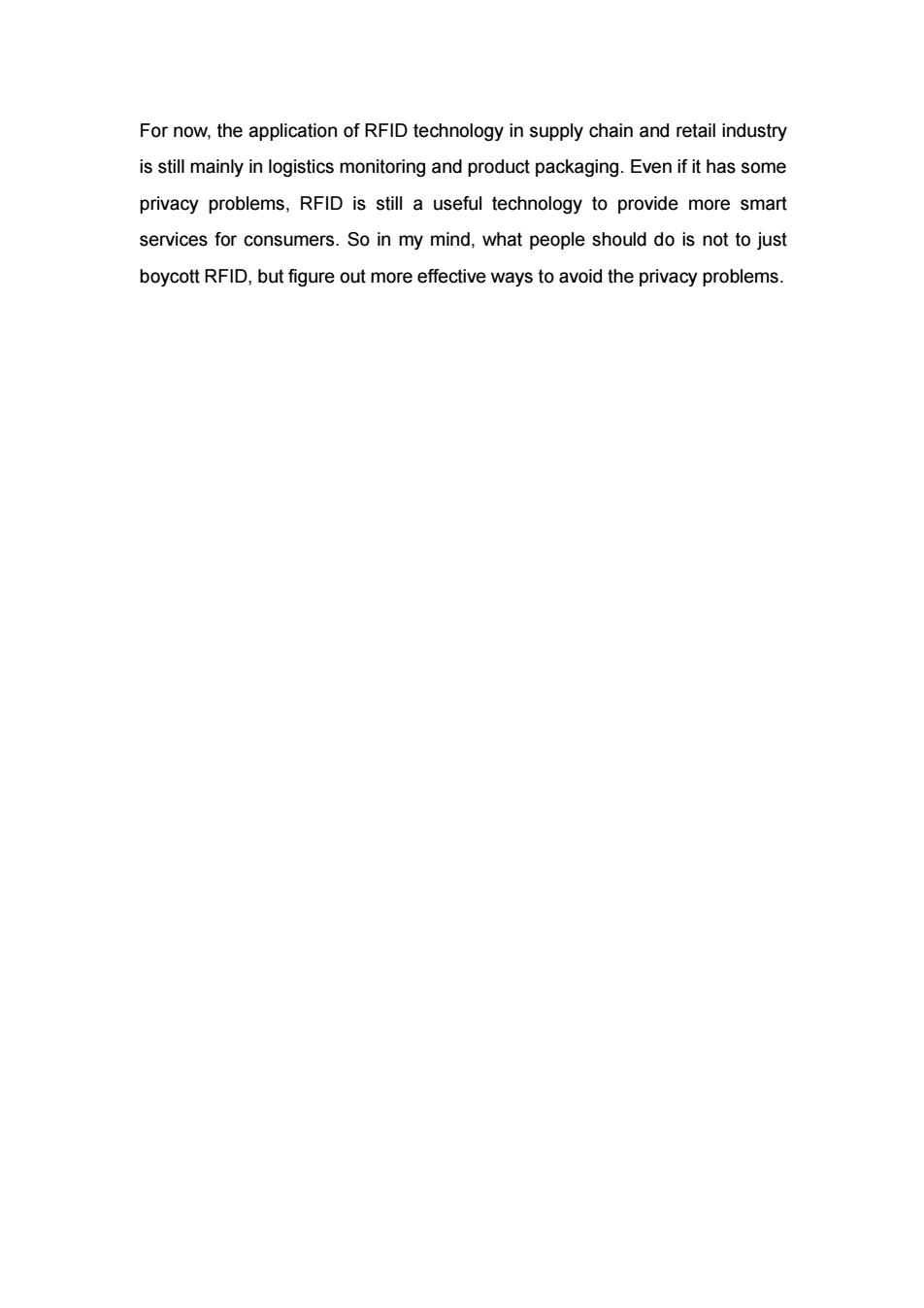
For now,the application of RFID technology in supply chain and retail industry is still mainly in logistics monitoring and product packaging.Even if it has some privacy problems,RFID is still a useful technology to provide more smart services for consumers.So in my mind,what people should do is not to just boycott RFID,but figure out more effective ways to avoid the privacy problems
For now, the application of RFID technology in supply chain and retail industry is still mainly in logistics monitoring and product packaging. Even if it has some privacy problems, RFID is still a useful technology to provide more smart services for consumers. So in my mind, what people should do is not to just boycott RFID, but figure out more effective ways to avoid the privacy problems